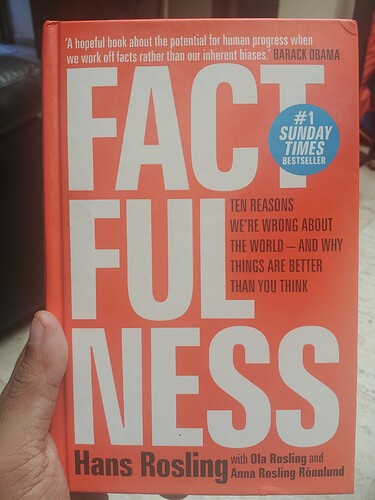Factfulness, Hans Rosling, 2018 - This is one of the most optimistic books I have read, probably alongside ‘The Rational Optimist’. As someone who is very fond of numbers and visualization of trends, I really loved this book. Did you know that world poverty is reducing dramatically over the years (halved in the last 20)? Did you know that tree cover of the planet has actually improved along with industrialization? Or that population is actually flat-lining with children per woman reducing drastically in the last 100 years? Similar good trends are seen in Education, vaccination, per capita incomes, life expectancy, protected species and the bad stuff like hiv infections, slavery, ozone depletion, plane crashes, nuclear arms, hunger, deaths from disaster etc are all coming down.
Why then do we perceive the world with such negativity as we usually do? The author(s) uncover so many biases in our thinking - from the gap instinct - where we see only extremes of rich and poor when a large majority like 90% could be in the middle. The negativity instinct driven my media (can’t survive reporting good news) that ignores long-term trends (things can be both better and bad at the same time!). the straight-line instinct that extrapolates short-term trends forever, especially the negatives (Ebola outbreaks) when most things are S-curves or slides, humps or doubling-lines. Fear, Urgency, Blame (very much in the lines of the book ‘Ubiquity’) and Generalisation instincts are self-explanatory. Another big bias is that most things are changing while our knowledge isn’t (the Destiny instinct). Combine this with single perspective instinct (man with a hammer syndrome) and our lack of perception of size - For eg. last year 4.2 million babies died - That’s definitely bad right? But did you know that this number was 14 million in 1950 and 4.5 million couple of years back? Wouldn’t the right way to compare a lot of these things per person and as trends than as standalone numbers that are anchorless?
What is shocking is that the misinterpritation of reality is done not just by illiterate or the average person but by experts and almost everyone (lot of survey statistics in the book). So what then is the right way to view the world? Seek numbers and seek the truth. One of the biggest takeaways for me in this book was the 4 levels of income and how thats a better way to view the world than by country or culture. What are the 4 levels? Using finger as a brush to sharing a toothbrush with the family to having an individual brush to having an electric toothbrush. This applies to a lot of things in the levels from water, cooking, transport, bedding etc. What a useful way to slot the world, when a bulk of the world - 5 billion out of 7 billion alive lives in levels 2 and 3 and all of them are constantly moving up the levels (check out gapminder website). You must know where they live and what they are going to be buying in the coming decades, than having preset notions about countries, cultures and politics. What a useful mental model to have! Needless to say at this point that I loved this book. 10/10
(The author was (died last year) a doctor, professor, adviser to WHO and UNICEF and has traveled the world extensively over the decades in the poorest neighborhoods of Africa and India and worked alongside people like Al Gore on climate change to Fidel Castro in Cuba and this book is one of the favorites of Bill Gates and Barack Obama. Adding this just to see if the Authority bias will make you want to pick it up)

